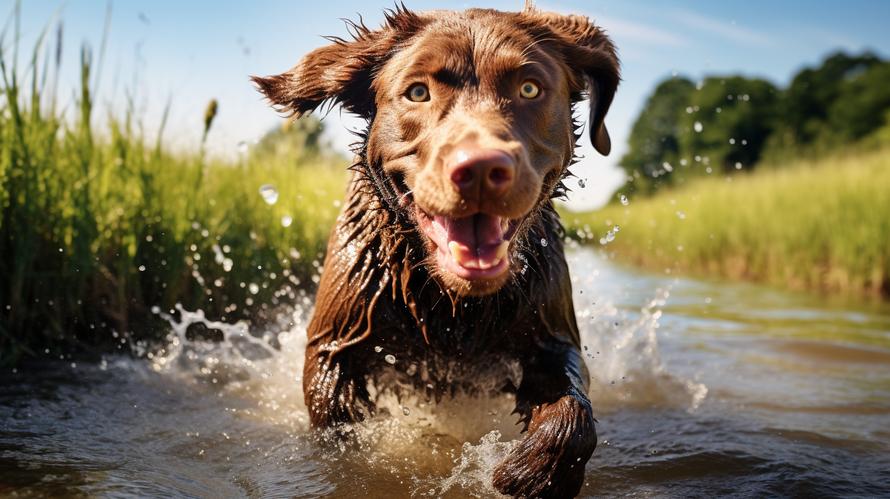If you’ve ever locked eyes with a Chesapeake Bay Retriever, chances are that the intelligence behind that penetrating gaze impressed you. These dogs, known affectionately as “Chessies”, have carved out an unconventional niche in the wide world of K9s, redefining the perceptions of what it means to be a loyal family dog and a proficient guard dog. What’s less known is how effective they are as guard dogs…A topic which whenever it rises creates a whirlwind of debate among dog enthusiasts.
The chessie is an American breed, born and bred for tough tasks in challenging environments. They hail from the Chesapeake Bay region – as their moniker suggests. Here, amidst the unforgiving conditions of this coastal habitat, the Chessie was bred to be a working dog. These dogs were developed to possess a sturdy build, a resilient temperament, and an exceptional ability to retrieve fish, ducks, and other game from the frigid waters of the Eastern Seaboard. All the aforementioned traits endowed, Chessies are terrific as protectors and companions, able to velocity up your heart rate with their courage, then melt your heart with their eyes!
Dwelling deeper into the protector aspect, surprisingly, Chessies have traits that naturally recommend them as effective guard dogs, not simply because they are big and robust, but due to the personality traits that they possess. Chesapeake Bay Retrievers can be a bit stand-offish, particularly around strangers, a quality that can make them excellent at fending off potential dangers, unwanted visitors, or intruders.
To boot, these dogs are incredibly intelligent and have a renowned problem-solving ability. This means they can appreciate and even predict situations that might pose a threat. On top of their mental prowess, they’re also known for having a staunch loyalty to their families. It’s a strong breed trait for a Chessie to put themselves between their family and a perceived threat!
Another reason that Chessies are lauded as good guard dogs is their territorial nature. A Chessie’s home and yard are its castle, which means they are not happy when a total stranger tries to step over the bounds of their cherished kingdom. If they sense trouble, you’ll see the guard-dog instincts snap into action. Those soft eyes turn steely, while their body tenses, ready to take action. Ironically, despite displaying this “Rottweiler-like vibe”, Chessies can also be quite loving and soft with their family – humans and pets alike, a reminder of their dual charm as protectors and companions.
From a psychological perspective, Chessies have a higher-than-average tolerance for discomfort or pain, combined with a fairly low-rate of instinctive aggression. This unique blend makes them not only very protective but also safe-guard dogs. They won’t attack on a whim, only when they calculate a real risk, much like a well-trained bodyguard.
Speaking of training, it’s important to note that these dogs require substantial, consistent disciple, training from an early age. This helps to harness their protective instincts and prevent any aggression-based anxiety. There’s nothing as crucial as thorough obedience training and the key here is consistency. One more thing, a bored Chessie can sometimes be a naughty Chessie. Regular physical activity and mental stimulation top the priority list in keeping your Chessie happy, content, and secure in their role as the family’s vigilant protector.
That said, Chesapeake Bay Retrievers aren’t for everyone. Prospective adopters need to understand the commitment and time investment required for owning such a breed. These dogs demand respect, attention, and most importantly, someone who loves them unconditionally and understands their needs. In return, they are prepared to give unwavering loyalty, active companionship, and that excellent vigilance one can expect of a reliable guard dog.
Even without the championship titles and the professional training, your Chessie will still be an extraordinary security measure. It goes beyond being a pet; it’s a companion, a protector, a part of the family. So, could a Chesapeake Bay Retriever be your new guard dog? Perhaps. But most importantly, could a Chessie become your new best friend? Undoubtedly, yes.



